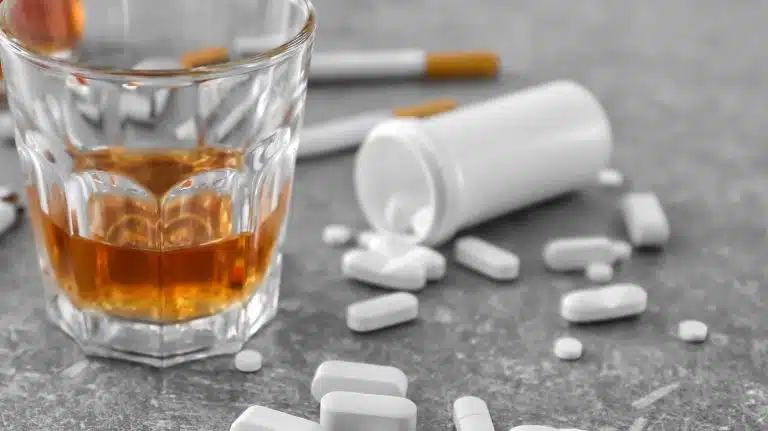Mixing Alcohol & Tramadol | Short-Term & Long-Term Dangers & Effects

Tramadol is a synthetic opioid drug sold under the brand names Ultram, Rybix, ConZip, and (as a combination of acetaminophen and tramadol) Ultracet.
As with other opioid narcotics, tramadol should never be mixed with alcohol in any quantities, as concurrent use can cause a severe and potentially life-threatening drug interaction.
Short-Term Dangers Of Mixing Tramadol & Alcohol
Tramadol, like other opiate painkillers, is a central nervous system depressant, meaning that its overall effects reduce activity across the central nervous system (CNS).
Ethanol, the substance consumed as drinking alcohol, also acts as a CNS depressant, though it works in a completely different method.
Central Nervous System Suppression
If you take tramadol and drink alcohol together (by definition a form of substance abuse), both drugs will work to suppress CNS activity. This may initially cause an incredible sense of relaxation, wellbeing, and euphoria at low doses, but at higher doses may cause:
- nausea and vomiting
- dehydration
- blood pressure changes
- slow or irregular heart rate and rhythm
- mood and behavioral changes
- impaired concentration, judgement, and inhibition
- dizziness
- loss of coordination
- loss of consciousness
- coma
- shallow, slow, or stopped breathing
The lattermost complication is known as respiratory depression and can end in permanent brain damage or death if effective medical care is not provided immediately.
Tramadol Overdose
Drinking alcohol with extended-release tramadol may also increase the risk of opioid overdose as alcohol has been theorized to interfere with the extended-release mechanism of the drug, greatly accelerating its release and absorption into the body.
If you suspect you or someone around you has experienced an alcohol and/or tramadol overdose, contact emergency medical services immediately.
Long-Term Dangers Of Mixing Tramadol & Alcohol
Long-term alcohol and tramadol abuse may lead to an increased risk of lasting physical or mental harm, even when compared with tramadol or alcohol abuse alone.
Adverse Health Conditions
Mixing alcohol and tramadol can heighten the risk of:
- cancer
- liver damage
- gastrointestinal issues
- stroke
- cognitive and memory impairment
- kidney damage
- sexual dysfunction
- harmful effects related to pregnancy and early childhood development
In addition, abusing these substances together is known to increase the rate and intensity at which physical dependence and addiction develop.
Effects Of Tramadol
As with other opiate drugs, tramadol attaches to opioid receptors in the brain, stimulating the release of neurotransmitters that block pain signals across the body.
Unlike other opiate drugs, however, tramadol may also increase the activity of the neurotransmitters serotonin and norepinephrine, a mood-elevating effect it shares with antidepressant medications.
Potential For Abuse
While weaker than morphine, tramadol remains a very potent painkiller and is commonly used to treat moderate to severe pain, including post-surgical pain and chronic pain.
Accordingly, it is classified as a Schedule IV controlled substance by the United States Drug Enforcement Administration (DEA) and the United States Food and Drug Administration (FDA).
This means that tramadol possesses a moderate potential for abuse as well as the development of physical dependence and addiction.
Common Side Effects Of Tramadol
The most common side-effects of tramadol, when used as prescribed, can include:
- mood changes
- sleepiness
- nausea
- vertigo
- drowsiness
- headache
Severe Side Effects
Uncommon side-effects include seizures, hives, rash, blisters, difficulty swallowing or breathing, swelling, hoarseness, agitation, delirium, nausea, sexual dysfunction, heart rhythm changes, and loss of consciousness.
If you or someone around you experiences any of these effects, contact your healthcare provider immediately.
Using alcohol (or any one of a number of illicit or prescription drugs) with tramadol increases the risk of experiencing these unwanted effects.
Tramadol Dependence & Withdrawal
When the use of tramadol continues over a long period of time, or when tramadol is prescribed or abused in high doses, some degree of physical dependence is likely to develop.
This means that the body may develop tolerance towards the drug’s effects and, if you stop taking tramadol, you may experience symptoms of both opioid withdrawal and serotonin-norepinephrine reuptake inhibitor (antidepressant) withdrawal.
Common tramadol withdrawal symptoms may include:
- numbness
- tingling/pins and needles
- ringing in the ears
- anxiety
- paranoia
- sleep disturbances
- cravings
Symptoms may persist for up to seven days, compared to three or four days for most other opioids.
Treatment For Polysubstance Abuse
While any form of drug or alcohol addiction can be difficult to treat, cases of poly-drug abuse and dependence are especially complex and challenging.
However, professional addiction treatment can provide services to help you or your loved one recover from substance use disorder, including:
- medical detox services
- cognitive behavioral therapy
- dual diagnosis treatment
- medication-assisted treatment
- Alternative or holistic therapies
If you would like to learn more or discuss potential treatment options, please us today.
Written by Ark Behavioral Health Editorial Team
©2024 Ark National Holdings, LLC. | All Rights Reserved.
This page does not provide medical advice.
Harvard Health - Is tramadol a risky pain medication?
National Institute on Drug Abuse (NIDA) - Commonly Used Drugs Charts
National Library of Medicine: MedlinePlus - Alcohol Use Disorder
National Library of Medicine: MedlinePlus - Tramadol

Questions About Treatment?
Ark Behavioral Health offers 100% confidential substance abuse assessment and treatment placement tailored to your individual needs. Achieve long-term recovery.
100% confidential. We respect your privacy.
Prefer Texting?
Our friendly support team is here to chat 24/7. Opt out any time.







 Learn More
Learn More








